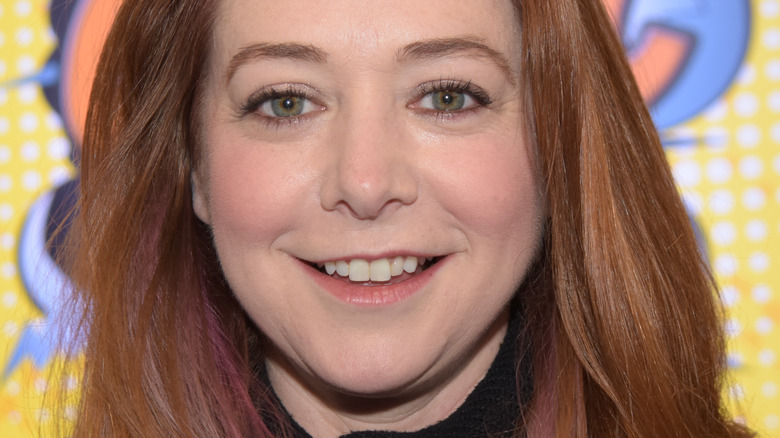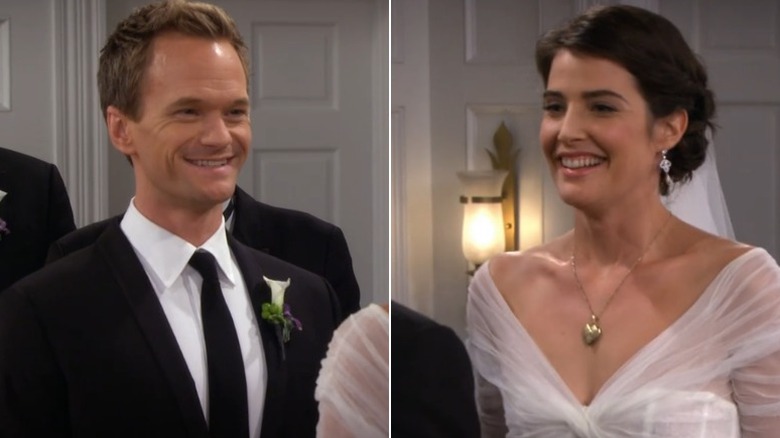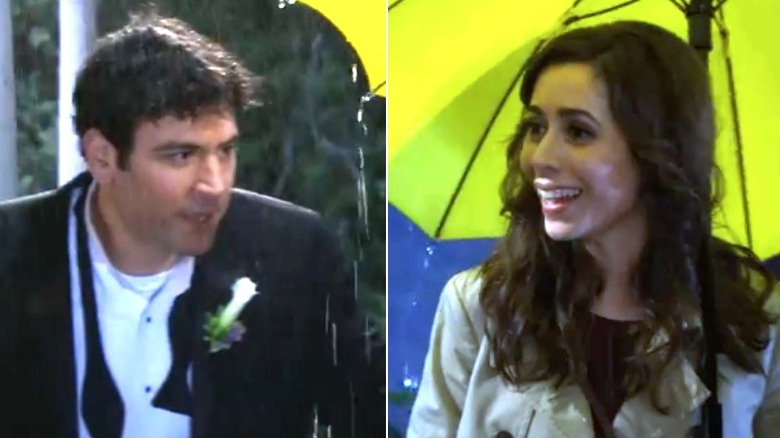Why Some HIMYM Fans Think They Found An Important Pattern In The Show
When the controversial series' finale of "How I Met Your Mother" debuted in 2014, an unprecedented 12.9 million viewers (per The Hollywood Reporter) tuned in to have their hearts broken to a degree nearly on par with the 2019 finale of HBO's "Game of Thrones." But for six full seasons and 23 episodes before the show's legacy-altering end note, Carter Bays and Craig Thomas' ongoing recollection sitcom kept fans and critics alike swooning (via Rotten Tomatoes).
Starring Josh Radnor as the lovesick central protagonist and Bob Saget-voiced narrator Ted, Neil Patrick Harris as the eternal bro-dude Barney, Jason Segel as the guileless, Midwest Nice Marshall, Alyson Hannigan as the endearing and artistic Lily, and MCU star Cobie Smulders as the archetypically badass Robin, the series followed the evolution of the group's dynamic via Ted's nine-season-long recollection of how he met his children's mother.
Though the series wasn't above using tried and true sitcom tropes, its relatability offered viewers something fresh, since it wasn't afraid to tackle the kind of real-world experiences that its fans either faced or were currently facing — things like infertility, the death of parents, and the surprisingly heartbreaking (if necessary) transition of college friendships into adult friendships. In short — unlike the intentionally melodramatic "Friends" or the intentionally heartless "Seinfeld" — "How I Met Your Mother" was peopled with flawed characters to whom audiences could directly and genuinely relate — a revolutionary approach that has everything to do with a sneaky pattern discovered by fans.
HIMYM uses the 'Hi' exchange to mark major moments
In a Reddit post titled "Never [realized] this was a thing," u/ReliqueOz posted three different screen grabs depicting a very specific kind of character interaction, one used numerous times in "How I Met Your Mother." Each image shows a partner from one of the show's main couples saying "Hi" to the other partner, and the latter responding to the former with the same simple greeting — as in, "Hi" (period) met with "Hi" (period). One scene shows Lily's flashback to meeting Marshall for the first time, another, Barney and Robin greeting one another before taking their vows, and another, Ted meeting Cristin Milioti's Tracy (his future wife and the show's titular mother) for the first time.
Although the subsequent thread dissolved occasionally into users sharing their favorite "HIMYM" episodes, a number of fans commented on the original poster's discovery. As u/Verano_Zombie points out, "when Ted imagines going to Tracy's house in the Time Traveler episode, the first thing he says is 'Hi'." Though a few comments displayed skepticism that this was, indeed, "a thing," at least one fan got to the heart of what makes the simple exchange so relatable: "Kind of a way to break the nervous tension," they wrote, keying in on the exchange's necessary but unspoken acknowledgment of the emotion of the moment (via Reddit).
It's a small but important observation. The exchanges' use of The Unsaid and The Implied functions, in-world, in much the same manner it functions with regard to the series' real-world impact and effect — a functionality that, in some ways, redeems and explains the series' finale.
HIMYM relied on emotional realism
Whether people started saying "Hi" to address the inarticulable emotion of a moment because the tactic was so often used in film and television, or film and television use the tactic because it's so often used in real life, we can't know. What we do know is that, in "How I Met Your Mother," its use exemplifies the series' devotion to emotional authenticity. In Emily Yahr's Washington Post article, "Why 'How I Met Your Mother' connected so deeply with the younger generation," she explains the series' thematic crux as follows: "Even if things don't go as planned, it's crucial to remember the smaller moments that make up the bigger stories in life."
Our memories come to us in a distilled and imperfect form — we recall how we felt during, as opposed to the exact details of, a given moment in time, particularly when that moment is emotionally saturated (per the National Library of Medicine). What sort of exchange more perfectly captures our response to being emotionally overwhelmed than a "Hi" standing-in for what we can't find the words to say? The show's hyper-realistic use of implication, as opposed to unrealistic articulation, is a major part of its success. Moreover, it helps to justify the series' somber but all-too-relatable ending. The revelation of Tracy's death may have been devastating for fans, but it's also perfectly in-keeping with the series' thematic throughline, and with its commitment to exploring the mechanics, functionality, and emotional import of our memories.


